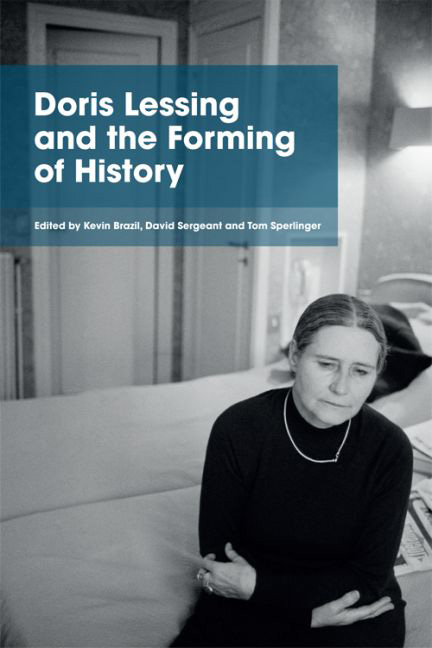Book contents
- Frontmatter
- Contents
- Acknowledgements
- Timeline
- Introduction
- 1 Early Lessing, Commitment, the World
- 2 ‘I'm an adolescent. And that's how I'm going to stay’: Lessing and Youth Culture 1956–1962
- 3 Sequence, Series and Character in Children of Violence
- 4 The Politics of Form: The Golden Notebook and Women's Radical Literary Tradition
- 5 Readers of Fiction and Readers in Fiction: Readership and The Golden Notebook
- 6 From The Grass is Singing to The Golden Notebook: Film, Literature and Psychoanalysis
- 7 ‘funny thing laughter, what's it for?’: Humour and Form in Lessing's Fiction,A
- 8 Lessing and the Scale of Environmental Crisis
- 9 Lessing and Time Travel
- 10 Lessing's Interruptions
- 11 Lessing's Witness Literature
- 12 A Catastrophic Universe: Lessing, Posthumanism and Deep History
- Select Bibliography
- Notes on Contributors
- Index
1 - Early Lessing, Commitment, the World
Published online by Cambridge University Press: 26 May 2017
- Frontmatter
- Contents
- Acknowledgements
- Timeline
- Introduction
- 1 Early Lessing, Commitment, the World
- 2 ‘I'm an adolescent. And that's how I'm going to stay’: Lessing and Youth Culture 1956–1962
- 3 Sequence, Series and Character in Children of Violence
- 4 The Politics of Form: The Golden Notebook and Women's Radical Literary Tradition
- 5 Readers of Fiction and Readers in Fiction: Readership and The Golden Notebook
- 6 From The Grass is Singing to The Golden Notebook: Film, Literature and Psychoanalysis
- 7 ‘funny thing laughter, what's it for?’: Humour and Form in Lessing's Fiction,A
- 8 Lessing and the Scale of Environmental Crisis
- 9 Lessing and Time Travel
- 10 Lessing's Interruptions
- 11 Lessing's Witness Literature
- 12 A Catastrophic Universe: Lessing, Posthumanism and Deep History
- Select Bibliography
- Notes on Contributors
- Index
Summary
In a section on commitment in the novel, the programme for the first Edinburgh International Literary Festival quotes the American writer and activist Dwight Macdonald:
The question of ‘commitment’ was settled for me in the thirties when we on Partisan Review struggled against the communists, who were trying to slip that particular strait-jacket over American poets, novelists and critics. Since they didn't have state power, they failed. I also remember M. Sartre's sophisticated absurdities on the subject. The issue has been settled a long time ago and that the English should still be kicking it around is an interesting example of cultural lag. (Hook 1962: 44)
In its select coordinates Macdonald's broadside is emblematic of discussions of its time – both positive and negative – on literary commitment. In these discussions, commitment is a phenomenon of the left, and the left as defined at its communist pole; political ideology is caricatured as dogma; Jean-Paul Sartre's notions of littérature engagée are evoked; and overall, the issue of commitment is cast in relation to a specific historical temporality, often leading out of a mythic and prelapsarian 1930s.
Doris Lessing's 1957 essay ‘The Small Personal Voice’ is another such discussion of literary commitment. Less willing to equate commitment tout court with the phenomena that Macdonald describes, Lessing's essay is still troubled by the potential of these phenomena to represent committed writing. So, for example, Lessing's historical temporality is more nuanced than Macdonald's – both more expansive and less simply linear – although the iconic, originary charge of the 1930s remains. This said, Lessing's points of reference diverge from those of Macdonald regarding Jean-Paul Sartre. ‘The Small Personal Voice’ evokes the Sartre not of littérature engagée, but instead an earlier Sartre, included in a list alongside Albert Camus, Jean Genet and Samuel Beckett as evincing a ‘pleasurable luxury of despair’ – an ‘acceptance of disgust’, which is ‘as much a betrayal of what a writer should be’ as doctrinaire socialist realism and its ‘acceptance of the simple economic view of man’ (Lessing 1994: 15). Lessing's omission is in many ways remarkable: Sartre's notions of commitment were not only the most prominent – and most thoroughly theorised – of the post-war period, but also intersect at key points with ‘The Small Personal Voice’.
- Type
- Chapter
- Information
- Doris Lessing and the Forming of History , pp. 10 - 25Publisher: Edinburgh University PressPrint publication year: 2016



